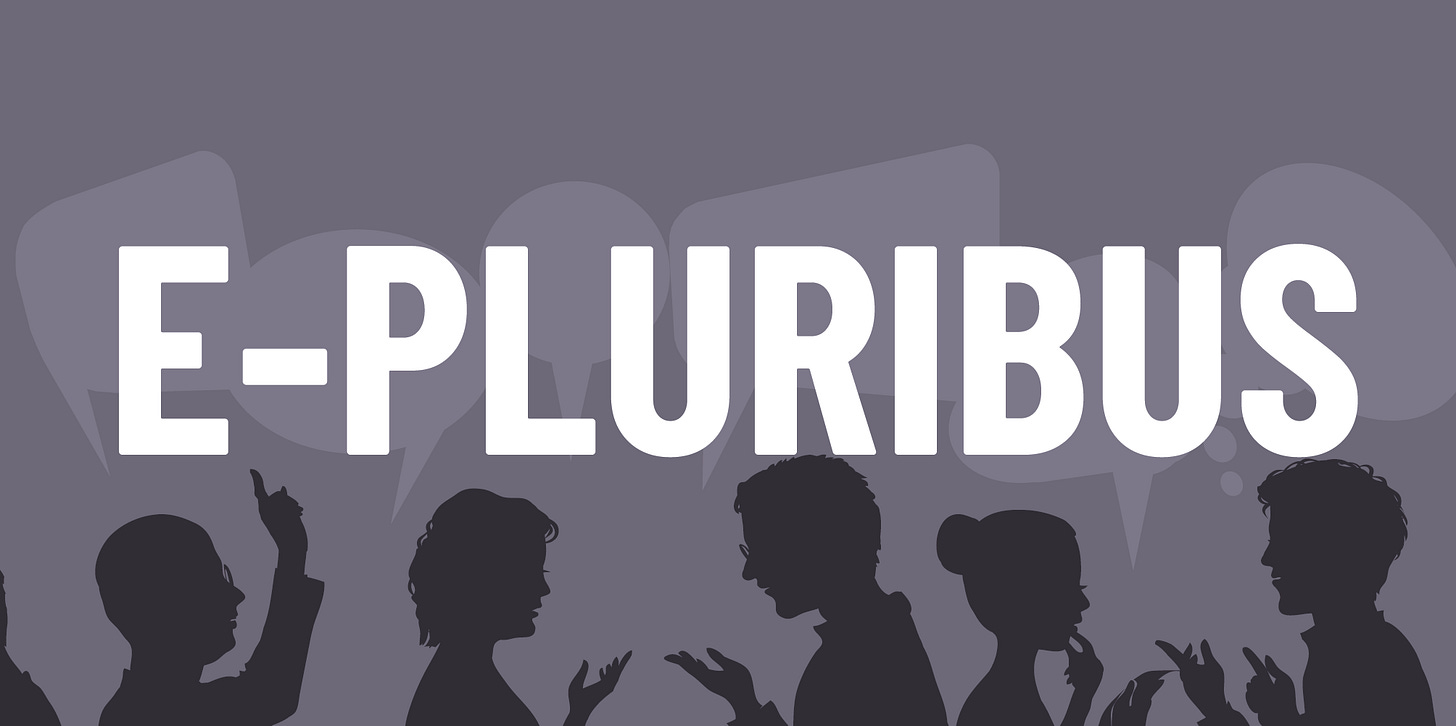E-Pluribus | May 19, 2022
How dangerous is social media, in defense of the classics, and the disingenuousness of identity politics.
A round-up of the latest and best writing and musings on the rise of illiberalism in the public discourse:
James O'Malley: Three Dubious Claims About Social Media
Despite (and perhaps because of) its popularity, social media is blamed for any number of societal, cultural and political ills. In one notable recent example, Jonathan Haidt wrote Why the Past 10 Years of American Life Have Been Uniquely Stupid for The Atlantic in which he likened social media’s impact to the Biblical Tower of Babel, shattering our ability to effective communicate and driving us apart rather than bringing us together. At Persuasion, James O'Malley takes issue with the apocalyptic view of social media, writing that however plausible the doomsaying sounds, the assertions simply lack proof.
[Dr Martin] Moore [at King’s College London] argues that “fake news” is a messy concept, and is better understood as several separate phenomena. For example, state-directed disinformation is different in scale and intent than click-farms that produce junk content to make money from advertising, and that is different again from legitimate reporting that is presented in hyperpartisan or sensational terms to boost engagement.
“It’s not particularly helpful,” says Moore. “It seems to me we try to shove it all in the bucket that says ‘fake news’ and say we have this problem that we have never had before.”
So simply worrying about the scale of the problem isn’t particularly useful in and of itself. Perhaps, though, social media-driven disinformation is impacting our politics?
Moore points to research by Matthew Gentzkow and Hunt Allcott, who attempted to measure the impact of fake news stories during the 2016 election. They calculate that a likely ballpark for the impact of the most viral fake news on vote shares is “on the order of hundredths of a percentage.” They stress that there are many factors that could influence this figure. But it is implausible that any would be large enough to radically shift the percentage upward into election-altering territory. The authors calculate that most voters probably read at least a few fake stories during the campaign—but the impact was minimal compared to the rest of the election noise.
Read it all.
John J. Miller: Rescuing Socrates
In November 2021, we included in our daily round up (e Pluribus item #3) a review of Roosevelt Montás’s book, Rescuing Socrates: How the Great Books Changed My Life and Why They Matter for a New Generation. This month at National Review, John Miller (host of NR’s Great Books podcast) profiles Montás and traces the events and influences on Montás that have led him to champion the classics of the past (including Socrates, of course) that have fallen on hard times in modern education.
“Our students often seem ill informed about the implications of their own political positions and are drawn, unthinkingly, into illiberal and bigoted stances,” said [Roosevelt] Montás in Aspen [to a gathering of presidents and provosts from colleges and universities]. “Our undergraduate curricula have not been educating our students for the life of free citizenship.” He excoriated his audience of left-leaning academics for their abandonment of the old-fashioned liberal arts.
[ . . . ]
A common complaint contends that a liberal-arts education is a luxury good for a privileged class. “The critiques that I began to hear — the canon as somehow retrograde, morally tainted, and unrepresentative of the diversity that we value — those critiques were so at odds with my experience,” says Montás, who insists that the liberal arts belong even in trade schools. Imagine a mechanic who studies to fix fuel-injection systems and transmissions. “There is a role for liberal education in there,” says Montás. “You should understand something about what the automobile has done to society. You should think about fossil fuels, the oil industry, and the environment. People who are training in those fields have the intellectual tools and capacities to engage in this kind of reflection.”
[ . . . ]
One of the challenges of making the case for liberal-arts education, writes Montás in Rescuing Socrates, is that it has a branding problem because it combines “the political baggage of the word ‘liberal’ with the reputed uselessness of studying art.” Moreover, the people who understand it best are the ones who need it least: “People who haven’t had the experience don’t know what they’re missing.” Yet everyone stands to gain, he says in our interview: “Liberal education shakes you from your certainties. It encourages intellectual humility, a tentativeness and skepticism about simple truths and absolute certainties.”
He even sees the great books as a solution to the problem of political division in today’s United States. The great books are “a site for conversation and debate,” he says. “Forget about Supreme Court nominations and the Build Back Better bill, and let’s talk about fundamental ideas about the meaning of government and society, the great questions that we face together as human beings. It seems to me that there is a potential for the great books to have a bridging function in society, to restore the connective tissue of society.”
Read it all here.
Jonah Goldberg: The Identity Politics Two-Step
The Dispatch’s Jonah Goldberg takes on identity politics in his latest for the site. While the left takes much of his fire, the right does not escape unscathed. The extremes on both sides have made the fight more about the fight itself than any principles the fight is meant to defend or preserve, and too often race is used as a lazy proxy by both sides to try to put some points on the board.
For the last 20 years, Democrats and identity politics activists have been celebrating the coming demise of America’s white majority. Some argue, somewhat unfairly, that it started with Ruy Texiera and John Judis’ 2002 book The Emerging Democratic Majority. Personally, I think it started with the Hudson Institute’s report Workforce 2000, which helped birth the diversity industry. Others point to the belief that the Obama coalition was the key to a permanent progressive partisan hegemony. The idea was that “demographics are destiny.” Non-whites vote Democratic. Non-whites are going to outnumber whites and when that happens—ta da!—it’s liberal politics forevermore.
It was all wrong, as Judis acknowledged a few years ago. The idea that demography is destiny is not always wrong, but the way it’s been used—by many on the left and the right—is basically as the plural form of identity politics.
Indeed, there’s a certain amount of racism embedded in the idea that if you know what a population will look like you will necessarily know what it will think. As Yascha Mounk noted on the latest episode of The Remnant, Irish Americans were once among the most reliable Democratic voters. Not anymore. Indeed, Judis points to another fatal flaw to all of this. “The U.S. census makes a critical assumption that undermines its predictions of a majority-nonwhite country. It projects that the same percentage of people who currently identify themselves as “Latino” or “Asian” will continue to claim those identities in future generations.” That isn’t happening.
[ . . . ]
I can’t leave it there. I don’t think the GOP or the conservative movement—such as it is these days—is institutionally racist. This is not to say there aren’t any racists on the right. There are too many of them, and their ranks are growing.
The right’s real problem boils down to two things: conspiracy and cowardice. Broadly speaking, the right hasn’t become institutionally racist, it’s become institutionally paranoid. All bad things are intended and brilliantly executed by our enemies. If we lose an election, it’s because it was rigged. If immigrants vote for Democrats, it’s because that’s why they were brought here in the first place. If our team riots, the real explanation must be that it was an Antifa false-flag operation, or part of a Deep State entrapment scheme, or some other paranoid idiocy. I am constantly amazed by how many conservatives can simultaneously insist that Joe Biden, Kamala Harris, AOC, Bernie Sanders, liberal pundits, et al, are at once idiots and fools, and also part of some of the most elaborate and brilliant schemes to tear down this country.
Read the whole thing.
Around Twitter
Via Jonathan Haidt and Heterodox Academy, some analysis on how colleges and universities shape activists across the ideological spectrum:
Via Nate Silver, the danger of overusing “disinformation”:
And speaking of that, here’s the Department of Homeland Security’s response to the outcry about its Disinformation Governance Board:
Finally, is there reason for optimism in the fight against illiberalism? Jack Hunter says yes:












